#zechariah 13:6
Text
From a Certain Point of View
Opening Scripture:
Zechariah 13:6 - And one will say to him, ‘What are these wounds between your arms?’ Then he will answer, ‘Those with which I was wounded in the house of my friends.’
Introduction: Kyrie Irving, Politics, and Star Wars
Kyrie Irving’s trade from Brooklyn Nets to Dallas Mavericks
How people see performance of past presidents
Luke Skywalker confronts Obi Wan Kenobi about his father’s true identity
Two parables
Parable of the talents (Matthew 25:14-30)
Parable of the prodigal son (Luke 15:11-32)
Summary of the parable of talents
Interestingly, similar parable told in Luke 19:21-27 with minas instead of talents
1 mina = 1.25 pounds in weight = 100 denarii = 4 month’s of wages for a worker in the time of Jesus (assuming a 6-day work week)
1 talent = 75 pounds = 60 minas = 20 years of wages in the time of Jesus (assuming a 6-day work week)
Master gives talents to his servants to do business for him while he goes away to a far country for a time
Each given amount according to his ability
First servant = 5 talents, second servant = 2 talents, third servant = 1 talent
First two servants double their money doing business
Third servant digs hole in the ground and hides money
When master returns, all servants give all the money back to the master with a report of what they had done
Master praises first two servants for their work and gives them promise of rulership
Third servant returns the one talent given to him with excuse of how he feared how harsh master was
Master rebukes third servant and orders him to be cast out from his presence
Master orders for third servant’s talent to be given to the first servant
Summary of the parable of the prodigal son
A man had two sons
The younger son audaciously asks for his inheritance now
Surprisingly, the man gives his son his inheritance
This young man goes away to a far country and wastes all his money
He inevitably falls into hard times
The only job he can find is a farm hand feeding swine
The younger son eventually realizes the error of his ways
He decides to return home, confess his sins to his father, and beg to be retained as a hired hand
Surprisingly, the father welcomes the son back home with open arms
The father orders his servants to dress the younger son in fine clothes
The father also orders the fattest calf to be killed and that a party be held in the younger son’s honor
The parable ends with an interesting conversation between the father and the older brother
The older brother cannot understand why they are having a party for the younger brother
Why are we talking about these two parables?
You’ve probably heard countless sermons on these two parables
For example, God gives us talents we must use
Or, it does not matter what talents you have or don’t have, God is only interested in your faithfulness in using what you have for His glory
Or, no matter how much you mess up in life, God can forgive all sins if you come to Him and sincerely repent
All good lessons, but not the ones I am interested in discussing today
Rather, I would like to focus on two conversations, one from each parable
Let’s look at the first parable read Matthew 25:24-30 together:
Then the man who had received one bag of gold came. ‘Master,’ he said, ‘I knew that you are a hard man, harvesting where you have not sown and gathering where you have not scattered seed. So I was afraid and went out and hid your gold in the ground. See, here is what belongs to you.’ “His master replied, ‘You wicked, lazy servant! So you knew that I harvest where I have not sown and gather where I have not scattered seed? Well then, you should have put my money on deposit with the bankers, so that when I returned I would have received it back with interest. “‘So take the bag of gold from him and give it to the one who has ten bags. For whoever has will be given more, and they will have an abundance. Whoever does not have, even what they have will be taken from them. And throw that worthless servant outside, into the darkness, where there will be weeping and gnashing of teeth.’
The third servant and the master
Let’s take a deeper look at the relationship between the third servant and the master
Why did the servant bury the talent of gold?
Ostensibly, he was afraid of his master
Perhaps he didn’t want to risk losing money on the master’s investment and get into trouble
Is this really the case, though?
Look at the performance of the other two servants
They each went out and doubled their money for the master
You don’t work that hard for someone you are afraid of or don’t like
I can tell you working in retail, it’s the same thing for employees and managers
If you have a bad manager, you only do the minimum necessary to not get in trouble
However, if you have a good relationship with your manager, you will go above and beyond for that person
Let’s go back to the second parable and read Luke 15:25-31 together:
Meanwhile, the older son was in the field. When he came near the house, he heard music and dancing. So he called one of the servants and asked him what was going on. ‘Your brother has come,’ he replied, ‘and your father has killed the fattened calf because he has him back safe and sound.’ “The older brother became angry and refused to go in. So his father went out and pleaded with him. But he answered his father, ‘Look! All these years I’ve been slaving for you and never disobeyed your orders. Yet you never gave me even a young goat so I could celebrate with my friends. But when this son of yours who has squandered your property with prostitutes comes home, you kill the fattened calf for him!’ My son,’ the father said, ‘you are always with me, and everything I have is yours. But we had to celebrate and be glad, because this brother of yours was dead and is alive again; he was lost and is found.’
Do you know what I find very interesting about this conversation?
It is how differently the elder son and the father view their relationship
The elder son actually views his relationship with his father in transactional terms
“I’ve been slaving for you” and “”I’ve never disobeyed your orders”
The obedient elder son never got a young goat, but the disobedient young son gets a party with the fatted calf?
In transactional terms, this is indeed not fair
The elder brother and younger son actually share a similar viewpoint about their father
It’s like two sides of the same coin
However, listen carefully to the father’s response
“My son, you are always with me and everything I have is yours”
The father had a more personal view of his children
The young goat and even the fatted calf were already the older son’s - just his for the asking
While in terms of a transactional relationship, the celebration may be unfair, but in terms of a personal relationship, a party is only appropriate
The lost son is now found
Back to the first parable: bad master or bad servant?
It seems to me the first two servants had a rather good relationship with their master, perhaps even a personal relationship
The third servant is claiming a transactional relationship with the master
However, the master calls the servant out on this claim
If the servant truly beloved his master was harsh, he would’ve deposited the money in a bank and earned interest for the master
That was the minimum necessary he would need to do to accomplish the task the master assigned to him
The parable of the good and wicked servants
Matthew 24:45-51: Who then is the faithful and wise servant, whom the master has put in charge of the servants in his household to give them their food at the proper time? It will be good for that servant whose master finds him doing so when he returns. Truly I tell you, he will put him in charge of all his possessions. But suppose that servant is wicked and says to himself, ‘My master is staying away a long time,’ and he then begins to beat his fellow servants and to eat and drink with drunkards. The master of that servant will come on a day when he does not expect him and at an hour he is not aware of. He will cut him to pieces and assign him a place with the hypocrites, where there will be weeping and gnashing of teeth.
Luke 12:42-48 same parable, but verse 48 says the wicked servant will be assigned a place with the unbelievers
So, what is the third servant’s relationship with the master?
It’s apparent that the third servant did not respect his master or even fear him
The master was interested in a personal relationship and the third servant was claiming a transactional relationship
But the truth of the matter is, the servant wanted to relationship with the master
There are three possible kinds of relationship we can have with God
You can choose to have no relationship with God and live life on your own terms
You can choose to have a transactional relationship with God
This is a trap a lot of Christians fall into
We “need to do this” or “we need to do that” to get blessings
You can choose to have a personal relationship with God
This is what Jesus desires most of us
He doesn’t merely want obedient slaves and servants
He wants obedient sons and daughters who love Him and know His will for them
Closing:
Jethro’s voice
Soft and breathy - some kids might make fun of him
However, his voice is the most beautiful voice in the world in my mind
Why?
People don't know what I know about Jethro
They don't know all the bronchoscopies and throat surgeries he had to go through
They don't know that his endocrinologist didn't even think he could ever speak at all
Because I know the true, you can never, EVER convince me otherwise
Zechariah 13:6
Jesus’ scars on his wrist, ankles, and side will be with Him for all of eternity
They may seem ugly, but one day we will acknowledge how beautiful they are
Those scars are eternal proof of the love He has for us, to die for our sins on an old wooden cross
Jesus wants to have a relationship with you
What kind will you choose?
0 notes
Text





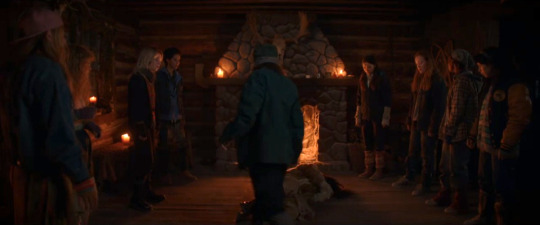




Yellowjackets 2x07: Burial / NIV Bible (Matthew 5:39 - Zechariah 13:6 - Matthew 26:28 - Hebrews 9:22 - Colossians 1:20 )
#idk either guys bear with me lmao. but lottie jesus agenda has never been realer#yellowjackets#lottie matthews
557 notes
·
View notes
Text
how to read the Bible
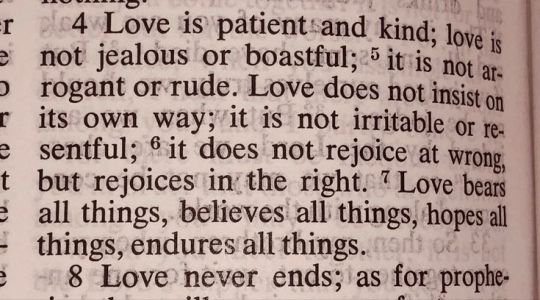
this is in order!
1. John
2. Mark
3. Matthew
4. Luke
5. Genesis
6. Exodus
7. Leviticus
8. Numbers
9. Dueteronomy
10. Romans
11. Galatians
12. Colossians
13. Proverbs
14. Ecclesiastes
15. Job
16. 1 Peter
17. 1 Corinthians
18. 2 Corinthians
19. Ephesians
20. Philippians
21. 1 Thessalonians
22. 2 Thessalonians
23. 1 Timothy
24. 2 Timothy
25. James
26. 2 Peter
27. 1 John
28. 2 John
29. 3 John
30. Jude
31. Psalms
32. Joshua
33. Judges
34. 1 Samuel
35. 2 Samuel
36. 1 Kings
37. 2 Kings
38. 1 Chronicles
39. 2 Chronicles
40. Ezra
41. Nehemiah
42. Jeremiah
43. Lamentations
44. Ezekiel
45. Joel
46. Amos
47. Obadiah
48. Nahum
49. Habakkuk
50. Zephaniah
51. Haggai
52. Zechariah
53. Malachi
54. Micah
55. Hosea
56. Luke
57. Esther
58. Jonah
59. Song of Solomon
60. Acts
61. Titus
62. Philemon
63. Hebrew
64. Isaiah
65. Daniel
66. Revelation
91 notes
·
View notes
Text

Hosea Redeems his Wife
(Zechariah 2:6-13)
1 Then said the LORD to me, Go yet, love a woman beloved of her friend, yet an adulteress, according to the love of the LORD toward the children of Israel, who look to other gods, and love flagons of wine. 2 So I bought her to me for fifteen pieces of silver, and for an homer of barley, and an half homer of barley: 3 And I said to her, You shall abide for me many days; you shall not play the harlot, and you shall not be for another man: so will I also be for you. 4 For the children of Israel shall abide many days without a king, and without a prince, and without a sacrifice, and without an image, and without an ephod, and without teraphim: 5 Afterward shall the children of Israel return, and seek the LORD their God, and David their king; and shall fear the LORD and his goodness in the latter days.
— Hosea 3 | American King James Version (KJVUS)
The American King James Version is Produced by Stone Engelbrite. It is a simple word for modern word update from the King James English.
Cross References: Genesis 31:19; Genesis 31:34; Exodus 34:15; Deuteronomy 4:30; Deuteronomy 21:13; Ruth 4:10; 2 Samuel 6:19; 1 Chronicles 16:3; Isaiah 2:2-3
#Hosea#Hosea's wife#reconciliation#redemption#Hosea 3#Book of Hosea#Old Testament#KJVUS#American King James Version#Holy Bible#Stone Engelbrite
20 notes
·
View notes
Text
Saints &Reading: Wednesday, February 21, 2024
february 8_february 21
E PROPHET ZECHARIAH (ZAKHARIAH) THE SICKLE-SEER FROM AMONGST THE 12MINOR PROPHETS (520 BC)
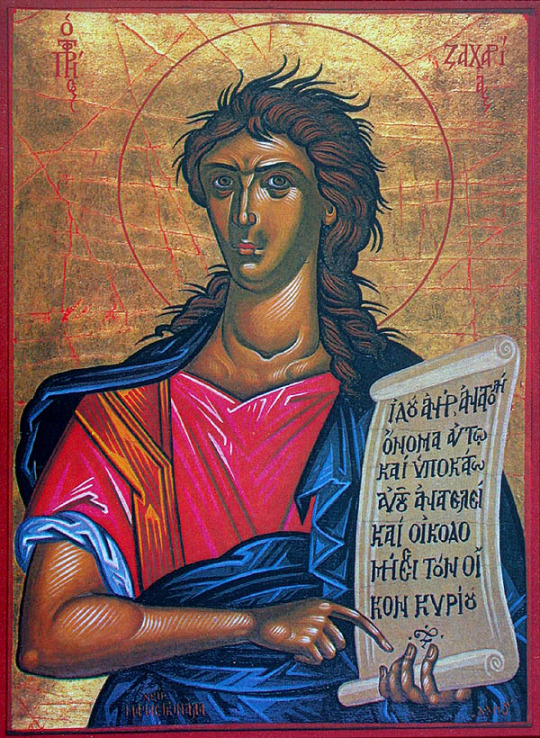
The Prophet Zachariah the Sickle-Seer the eleventh of the twelve Minor Prophets. He was descended from the tribe of Levi, and seems to have been a priest (Nehemiah 12:4,16). He was called to prophetic service at a young age and became, in the wondrous expression of church hymnology, “a spectator of supra-worldly visions.”
The Book of the Prophet Zachariah contains inspired details about the coming of the Messiah (Zach 6:12); about the last days of the Savior’s earthly life, about the Entry of the Lord into Jerusalem on a young donkey (Zach 9:9); about the betrayal of the Lord for thirty pieces of silver and the purchase of the potter’s field with them (Zach 11:12-13); about the piercing of the Savior’s side (Zach 12:10); about the scattering of the apostles from the Garden of Gethsemane (Zach 13:7); about the eclipse of the sun at the time of the Crucifixion (Zach 14:6-7).
“Enlightened by dawnings all above,” the Prophet Zachariah, “saw the future as it were the present.” According to Tradition, this “most true God-proclaimer” lived to old age and was buried near Jerusalem, beside his illustrious contemporary and companion, the Prophet Haggai (December 16). The title “Sickle-Seer” given Zachariah comes from a vision in which he saw a sickle flying in the air, destroying thieves and perjurors (Zach 5:1-3).
The holy Prophet Zachariah died around 520 B.C. His tomb was discovered in 415 in a village near Eleutheropolis (Sozomen, Hist. Eccles. VI:32, IX:17). At the prophet’s feet was the body of a child dressed in royal accouterments. His holy relics were transferred to the church of Saint James the Brother of the Lord (October 23) in Constantinople.

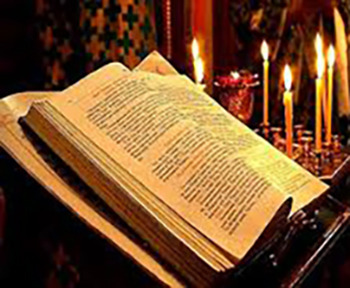
1 PETER 4:1-11
1Therefore, since Christ suffered for us in the flesh, arm yourselves also with the same mind, for he who has suffered in the flesh has ceased from sin, 2 that he no longer should live the rest of his time in the flesh for the lusts of men, but for the will of God. 3 For we have spent enough of our past lifetime in doing the will of the Gentiles-when we walked in lewdness, lusts, drunkenness, revelries, drinking parties, and abominable idolatries. 4 In regard to these, they think it strange that you do not run with them in the same flood of dissipation, speaking evil of you. 5 They will give an account to Him who is ready to judge the living and the dead. 6For this reason the gospel was preached also to those who are dead, that they might be judged according to men in the flesh, but live according to God in the spirit. 7 But the end of all things is at hand; therefore be serious and watchful in your prayers. 8 And above all things have fervent love for one another, for "love will cover a multitude of sins." 9 Be hospitable to one another without grumbling.10 As each one has received a gift, minister it to one another, as good stewards of the manifold grace of God. 11 If anyone speaks, let him speak as the oracles of God. If anyone ministers, let him do it as with the ability which God supplies, that in all things God may be glorified through Jesus Christ, to whom belong the glory and the dominion forever and ever. Amen.
MARK 12:28-37
28 Then one of the scribes came, and having heard them reasoning together, perceiving that He had answered them well, asked Him, "Which is the first commandment of all?" 29 Jesus answered him, "The first of all the commandments is: 'Hear, O Israel, the LORD our God, the LORD is one. 30 'And you shall love the LORD your God with all your heart, with all your soul, with all your mind, and with all your strength.' This is the first commandment. 31 And the second, like it, is this: 'You shall love your neighbor as yourself.' There is no other commandment greater than these. 32 So the scribe said to Him, "Well said, Teacher. You have spoken the truth, for there is one God, and there is no other but He. 33 And to love Him with all the heart, with all the understanding, with all the soul, and with all the strength, and to love one's neighbor as oneself, is more than all the whole burnt offerings and sacrifices. 34 Now when Jesus saw that he answered wisely, He said to him, "You are not far from the kingdom of God." But after that no one dared question Him. 35 Then Jesus answered and said, while He taught in the temple, "How is it that the scribes say that the Christ is the Son of David? 36 For David himself said by the Holy Spirit:'The LORD said to my Lord, Sit at My right hand, Till I make Your enemies Your footstool." ' 37 Therefore David himself calls Him 'Lord'; how is He then his Son? And the common people heard Him gladly.
#orthodoxy#orthodoxchristianity#easternorthodoxchurch#originofchristianity#spirituality#holyscriptures#gospel#bible#wisdom#saints
10 notes
·
View notes
Text
The horses appear
"In the night I saw a man riding on a red horse! He was standing among the myrtle trees in the glen; and behind him were red, sorrel, and white horses. Then I said, 'What are these, my lord?'
The angel who talked with me said to me, 'I will show you what they are.'
So the man who was standing among the myrtle trees answered, 'They are those whom the LORD has sent to patrol the earth.' " (Zechariah 1:8-10 NRSVA)
Study questions:
(1) This takes place "in the second year of Darius" (v 7). What is the significance of that era? Why would that be a time of prophecy and vision?
(2) What might be the symbolism of the myrtle trees?
(3) This is the first mention of an angel in Zechariah. Why does he speak as if we're already familiar with this angel?
(4) First there is a man "riding on a red horse" and then he is "standing among the myrtle trees". Is this the same man, or are there two men; one riding and one standing?
(5) The phrase "patrol the earth" literally means "to walk the earth". It also shows up in Psa 56:13 and Zechariah 6:7. This is also what the Satan says in Job 1:7 and Job 2:2. What might they be doing? Are they looking for something?
#the bible#four horsemen#four horsemen of the apocalypse#angels#trees#christianity#new revised standard version anglicised#visions#wandering#travel#zechariah 1#bible verse
4 notes
·
View notes
Text
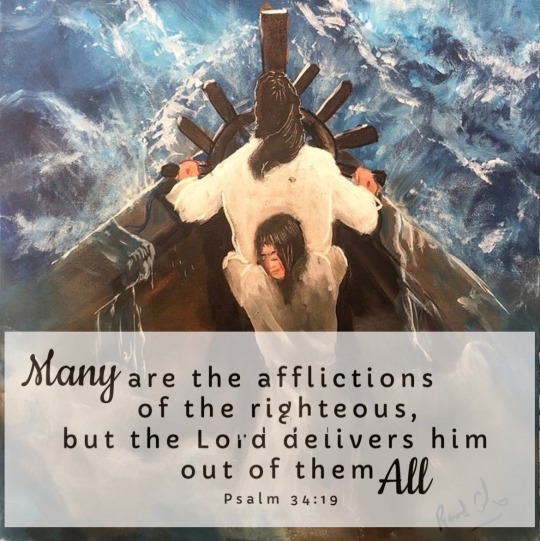
You are the one who has done this!
(Charles Simeon)
"I was silent; I would not open my mouth, for You are the one who has done this!" Psalm 39:9
"For You, O God, have tried us; You refined us like silver." Psalm 66:10
"Behold, I have refined you, but not as silver; I have tried you in the furnace of affliction!" Isaiah 48:10
"I will refine them as silver is refined, and test them as gold is tested." Zechariah 13:9
"Those whom I love, I rebuke and discipline." Revelation 3:19
"He knows the way that I take; when He has tried me, I shall come forth as gold!" Job 23:1
Though Job was presently in as hot a furnace as he could possibly endure--he yet believed that he was put into it by a skillful Refiner, for the purifying of his soul from dross.
Those who are truly godly, learn to view the hand of God both in their comforts and in their troubles. They know that affliction does not come by chance, but from the hand of Him who directs everything with consummate wisdom. "Affliction does not come from the dust, nor does trouble spring from the ground!" Job 5:6
The ungodly look no further than to second causes; and therefore yield to murmuring and impatience whenever they receive harm from the hand of their fellow-creatures.
But the godly are persuaded that their portion, whatever it is--is mixed for them by God Himself, and that it is intended "to purge away their iniquity," that they may be partakers of His holiness. This was evidently the view which Job had of troubles, notwithstanding they sprang from such various sources.
No one can love trouble on its own account; since it is "never joyous, but grievous." But holiness is the highest wish of the godly soul; it is regarded as a pearl that cannot be purchased at too high a price. Trials, however painful, are welcomed, if they may but be the means of promoting this blessed end.
Those who are in the furnace of affliction must ever look above all second causes, and see God appointing the nature, measure, and duration of all their trials!
"Blessed is the man whom God corrects; so do not despise the discipline of the Almighty!" Job 5:17
"And we know that God causes all things to work together for good, to those who love God, to those who are called according to His purpose!" Romans 8:28
"God disciplines us for our good, that we may share in His holiness. No discipline seems pleasant at the time, but painful. Later on, however, it produces a harvest of righteousness and peace for those who have been trained by it." Hebrews 12:10-11
~ ~ ~ ~
13 notes
·
View notes
Text
A CONTRITE HEART THAT TREMBLES AT HIS WORD
20 I have found my servant David. I have anointed him with my holy oil.
21 I will STEADY him with my hand; with my powerful arm I will make him strong.
22 His ENEMIES WILL NOT DEFEAT HIM, nor will the wicked overpower him.
23 I will BEAT DOWN his adversaries before him and destroy those who hate him.
28 I will LOVE him and be kind to him forever; MY COVENANT WITH HIM WILL NEVER END."
Psalm 89:28 (NLT)
God establishes covenant with His beloved.
The text of this teaching talked about the never ending covenant which God had with David and his descendants.
God promises to love him and be kind to him forever. God's love and kindness are never ending.
You also can do what would register you in the Heart of God forever. You can do what others have not done that would trigger His love for you.
God has established different covenants with different people in the past and in the contemporary time.
There are conditions for cutting or establishing a covenant with God.
Someone who has acknowledged Jesus Christ as Lord and Saviour would have to pay attention to some of the principles found in the Bible, for God to be moved and established a covenant with him or her.
(i) A Believer whom God would potentially establish a covenant with, should be someone who walks in total Obedience to God's instructions.
(ii) The submission of such must be uncompromising.
(iii) Such should be able to live sacrificially. He or she should be one who is willing to make sacrifices in doing God's Will.
(iv) Giving should be part of the person's life. Giving to God; His work, servants, the Needy, and whichever way he or she is prompted or stirred to do it.
(v) Such would have to love God with all his or her Heart, soul or mind, and strength (Mark 12:30). The love for God and His Kingdom should take precedence in the heart of such a person (1 King 3:3,4). This love for God and His Kingdom would enable the person to give all; his or her life, and whatever they have (2 Corinthians 8:1-5).
(vi) Humility would be the hallmark, a distinctive feature, of the person. God will not establish a covenant with a proud person (James 4:6; 1 Peter 5:5).
(vii) The person would have to be a person who understands the importance of Praise (Hebrews 13:15). Ascribing the glory of his or her success to God. If God knew you would steal, or rob Him of His Glory, He would not allow your lifting. His Glory would He not share with anyone (Isaiah 42:8).
To small or large extent, whatever God will do in someone's life, premises on the condition or the state of the person's Heart towards Him and His Kingdom.
What is going on in your heart determines His works and doings in the affairs of your life.
Another important thing that cannot be put aside is, what you do about His Word.
a. Are you indifferent to His Word? (Zechariah 7:13).
b. If you realized that you have missed it, how do you feel about it in your Heart—Are you remorseful? (2 Samuel 12:13; 24:10).
c. Do you tremble at His Word or despise it? (Psalm 34:18; Isaiah 57:15).
d. Do you trivialize His commands or instructions? (Proverbs 1:28,29).
e. Do you reverence Him wholeheartedly? (Deuteronomy 10:12; 30:6; Psalm 119:11).
"MY hands have made both heaven and EARTH; THEY and everything in them are MINE. I, THE LORD, HAVE SPOKEN! “I WILL BLESS THOSE WHO HAVE HUMBLE AND CONTRITE HEARTS, WHO TREMBLE AT MY WORD."
Isaiah 66:2 (NLT)
"THE LORD IS NEAR to those who HAVE A BROKEN HEART, And SAVES SUCH AS HAVE A CONTRITE SPIRIT."
Psalm 34:18 (NKJV)
"THE SACRIFICES of God are A BROKEN SPIRIT, A BROKEN and A CONTRITE [repentant] HEART— These, O God, YOU WILL NOT DESPISE."
Psalm 51:17 (NKJV)
God shows mercy to those who had a contrite Heart, who tremble at His Word:
15 FOR He says to Moses, “I WILL HAVE MERCY ON WHOMEVER I WILL HAVE MERCY, AND I WILL HAVE COMPASSION ON WHOMEVER I WILL HAVE COMPASSION.” 16 SO then IT IS NOT of him who WILLS, NOR of him who RUNS, BUT of God who SHOWS MERCY" (Romans 9:15,16 NKJV).
Someone who is heady, stubborn, might not easily receive His mercy.
Trembling at God's Word makes you a candidate for His mercy and Blessings.
God detests pride, and whoever is proud cannot receive anything from Him.
God, rather, resists or stands on the way of the proud: "AND HE GIVES GRACE GENEROUSLY. As the Scriptures SAY, “GOD OPPOSES THE PROUD BUT GIVES GRACE TO THE HUMBLE"" (James 4:6 NLT).
READ: 1 Peter 5:5
a. Pride is when you want to get or have something done in your own way, rather than God's Way. When you are not willing to submit your Will to embrace God's Will.
b. Pride is the inability to relegate the self and enthrone God. When you do not give to God, His rightful place in your life.
c. Pride is when you are self-centered and strong-willed. When your life is centered on the self, and you are unable to endure because of other people, God, and His Kingdom.
d. When nobody matters to you, but only you. The talking about the self, calling attention to the self, wanting to dominate every discussion.
e. When you believe that you are always Right, whilst others are wrong. That your opinions are the best and should be considered and accepted.
Humble yourself that you might be exalted: HUMBLE YOURSELVES IN THE SIGHT OF THE LORD, AND HE WILL LIFT YOU UP" (James 4:10 NKJV).
You will not fail in Jesus' name.
Whatever is contrary to your health is rebuked in Jesus' name.
What God has not planted in your life, working against your health, is rooted up in Jesus' name.
Peace!
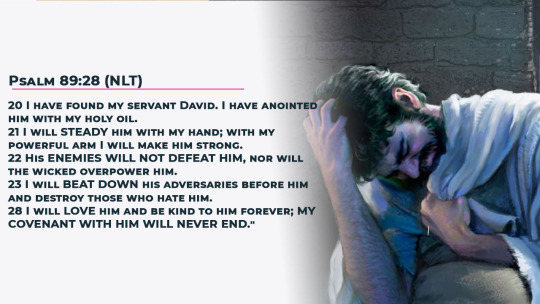
#christianity#gospel#christian living#christian blog#the bible#devotion#faith#my writing#jesus#prayer
2 notes
·
View notes
Text

ADDING TO GOD'S CONDITIONS
Exodus 12:13 -- "Now the blood shall be a sign for you on the houses where you are. And when I see the blood, I will pass over you; and the plague shall not be on you to destroy you....."
On the night of the first Passover, many of the children of Israel were probably anxious.
They may have said "Yes! We were told to put the blood of the lamb on the doorposts of our home and everything would be all right. Is that true?"
Or "Can the blood really protect me? Or How much blood do I have to put on my doorposts? Or Will the angel of death get me if I am fearful?
We do not need to add to God's conditions. He said, "When I see the blood, I will pass over you; and the plague shall not be on you to destroy you."
He DID NOT say, "When I see the blood, plus your understanding, efforts, obedience, faithfulness and refusal to give in to fear, then I will pass over you."
We are delivered by the blood of Jesus alone. If we think that it is because of our faith, then we will always be wondering, "Do I have enough faith? No, it is the blood alone that saves.
Saves from what? -- anything that doesn't match up with heaven.
Matthew 6:10 -- "Your kingdom come, Your will be done on earth as it is in heaven."
If we think that our deliverance depends partly on God and partly on us, we will not have a settled peace in our heart. But when we know that it its the blood alone that saves, we will have an unshakable peace.
APPLYING THE BLOOD CONTINUALLY
Zechariah 9:11 - "As for you also, because of the blood of My covenant with you, I have set your prisoners
free from the waterless pit."
1 John 1:7 - "But if we walk in the Light as He Himself is in the Light, we have fellowship with one
another, and the blood of Jesus His Son cleanses us from all sin."
God commanded Israel to keep the Passover continually and to apply the blood even after coming into the promised land. And so it is with us – the blood of Jesus must be applied continually on our lives.
TRIUMPH IN THE BLOOD
2 Corinthians 2:14 "But thanks be to God, who always leads us in triumph in Christ, and manifests through us the sweet aroma of the knowledge of Him in every place."
The attitude of those who live from the triumph of Christ is different than those who live under the influence of the past. The only part of the past that I have legal access to is the testimony of the Lord. The past is dead, buried, forgotten and covered under the blood which is more than sufficient. Living from the victory of Christ is the privilege of every believer. This realization is at the foundation of a church that will triumph even as He has triumphed.
Hebrews 9:12 & 10:12 -
"Neither by the blood of goats and calves, but by his own blood he entered in once into the holy place, having obtained eternal redemption for us. But this man, after he had offered one sacrifice for sins forever, sat down on the right hand of God."
The apostle John wrote, "They overcame him because of the blood of the Lamb and because of the word of their testimony, and they did not love their life even when faced with death." (Rev. 12:11).
The elements of victory are recounted to us in this passage. They overcame him by the blood of the Lamb: This means we no longer are fighting FOR victory but we fight FROM victory. Being triumphant is assured when we enter the battle.
ALBERT FINCH MINISTRY:
13 notes
·
View notes
Text

STAND WITH GOD NO MATTER WHAT -- KJV (King James Version) Bible Verse List
Visit https://www.billkochman.com/VerseLists/ to see more.
"Then Peter and the other apostles answered and said, We ought to obey God rather than men."
Acts 5:29, KJV
"What shall we then say to these things? If God be for us, who can be against us?"
Romans 8:31, KJV
"So that we may boldly say, The Lord is my helper, and I will not fear what man shall do unto me."
Hebrews 13:6, KJV
"Many therefore of his disciples, when they had heard this, said, This is an hard saying; who can hear it? When Jesus knew in himself that his disciples murmured at it, he said unto them, Doth this offend you? What and if ye shall see the Son of man ascend up where he was before? It is the spirit that quickeneth; the flesh profiteth nothing: the words that I speak unto you, they are spirit, and they are life. But there are some of you that believe not. For Jesus knew from the beginning who they were that believed not, and who should betray him. And he said, Therefore said I unto you, that no man can come unto me, except it were given unto him of my Father. From that time many of his disciples went back, and walked no more with him."
John 6:60-66, KJV
"Whosoever therefore shall be ashamed of me and of my words in this adulterous and sinful generation; of him also shall the Son of man be ashamed, when he cometh in the glory of his Father with the holy angels."
Mark 8:38, KJV
"And he said, I have been very jealous for the LORD God of hosts: for the children of Israel have forsaken thy covenant, thrown down thine altars, and slain thy prophets with the sword; and I, even I only, am left; and they seek my life, to take it away. And he said, Go forth, and stand upon the mount before the LORD. And, behold, the LORD passed by, and a great and strong wind rent the mountains, and brake in pieces the rocks before the LORD; but the LORD was not in the wind: and after the wind an earthquake; but the LORD was not in the earthquake: And after the earthquake a fire; but the LORD was not in the fire: and after the fire a still small voice. And it was so, when Elijah heard it, that he wrapped his face in his mantle, and went out, and stood in the entering in of the cave. And, behold, there came a voice unto him, and said, What doest thou here, Elijah? And he said, I have been very jealous for the LORD God of hosts: because the children of Israel have forsaken thy covenant, thrown down thine altars, and slain thy prophets with the sword; and I, even I only, am left; and they seek my life, to take it away."
1 Kings 19:10-14, KJV
"And Jonathan said to the young man that bare his armour, Come, and let us go over unto the garrison of these uncircumcised: it may be that the LORD will work for us: for there is no restraint to the LORD to save by many or by few."
1 Samuel 14:6, KJV
"Then he answered and spake unto me, saying, This is the word of the LORD unto Zerubbabel, saying, Not by might, nor by power, but by my spirit, saith the LORD of hosts."
Zechariah 4:6, KJV
If you would like more info regarding the origin of these KJV Bible verse lists, go to https://www.billkochman.com/VerseLists/. Thank-you!
https://www.billkochman.com/Blog/index.php/stand-with-god-no-matter-what-kjv-king-james-version-bible-verse-list/?feed_id=115052&STAND%20WITH%20GOD%20NO%20MATTER%20WHAT%20--%20KJV%20%28King%20James%20Version%29%20Bible%20Verse%20List
#All_Posts#Bible_Verse_Lists#bible#bible_study#bill_kochman#bills_bible_basics#king_james_version#kjv#list#scripture#scriptures#stand#stand_with_god#topical#verse#verses
4 notes
·
View notes
Text
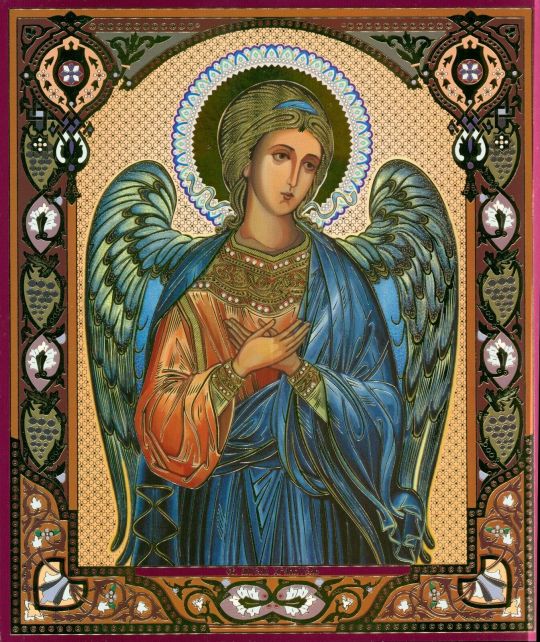
Angels in the Bible and the Liturgy
For an angel of peace... One of the things we pray for at every Liturgy is for an angel to guard us and guide us. Each of us has been given a guardian angel. It is about our guardian angels that the Lord Jesus spoke of when He admonished His disciples not to "look down" on children, "for I tell you that their angels in heaven always see the face of my Father in heaven" (Matthew 18:10-11). And during Baptism, the celebrating priest prays specifically that an angel of light be assigned to the child being baptized. [...]
The Liturgy speaks over and over again about the reality of angels and archangels, the cherubim and the seraphim. The Scriptures witness to the reality of angels from beginning to end, from Genesis to the Book of Revelation. What are angels? The word 'angel' is a Greek word that means 'messenger'. Angels are purely spiritual beings that have often served as God's messengers at critical times in human history. In the Old Testament, the Archangel Michael appears to the prophet Daniel (Daniel 10:13) and is mentioned again in Jude 9 and the Book of Revelation (Revelation 12:7). In the New Testament, the Archangel Gabriel appears to both Zechariah to announce the birth of his son, John the Baptist (Luke 1:10-20); and to Mary the Theotokos to announce the birth of her son, our Lord Jesus Christ (Luke 1:26-37). An angel comforts the Lord Jesus in the Garden of Gethesemane shortly before His crucifixion (Luke 22:43); and angels announce His resurrection to the women who come to His tomb and find it empty (Luke 24:4-7). At the Second Coming, the Gospel of Matthew (Matthew 25:31) tells us that the Lord will be escorted by "all the angels".
The Scriptures mention many different kinds or ranks of angels. The cherubim and the seraphim are mentioned throughout the Old Testament and are particularly associated with the Temple in Jerusalem and the Ark of the Covenant by the prophets Isaiah and Ezekiel. In fact, the angelic hymn that Isaiah (Isaiah 6:5) heard sung by the seraphim in the Temple: "Holy, holy, holy Lord God of Sabaoth: Heaven and earth are full of Your glory" is still sung at every celebration of the Liturgy to this day. In the New Testament, the Apostle Paul mentions other types of angels such as thrones, powers and principalities (Colossians 1:16; Ephesians 1:21). The role of angels has been significant in the history of our salvation as well as in our praise and worship of the living God during the Liturgy. We believe that if we listen carefully to the message of the angels, we can often hear the voice of God in our lives.
[Source of text: The Divine Liturgy of our Father among the Saints John Chrysostom (with Commentary and Notes)]
4 notes
·
View notes
Text
Yesterday, IDF forces recovered the bodies of two people who had been taken hostage. One had been alive at the time of abduction, Eden Zechariah, while the other, Zic Dado, was killed during the attacks on 19/7/23.


The following list are those hostages who have been pronounced dead.
Civilians
1 Shani Louk (23) Nova
2 Mia Goren (56) Nir Oz
3 Aryeh Zalmanovich (86) Nir Oz
4 Judith Weiss (65) Be’eri
5 Clemence Mtenga (22)Nir Oz , unclear if was taken to Gaza ?
6 Ofir Tsarafati (27) Nova
7 Aviv Atzili (49) Nir Oz, unclear if was taken to Gaza ?
8 Ronen Engel , announced Dec 1 (55) Nir Oz
9 Guy Iloz , announced Dec 1 (26) Nova
10 Ofra Keider - Dec 1 (70) Be’eri
11 Eliyahu Margalit - Dec 1 (75) Nir Oz)
12 Yonatan Samerano (21) , Nova . Announced Dec 4
13 Sahar Baruch (24), Beeri. Announced Dec 8
14 Eitan Levy (53) Beeri . Body being held in Gaza . Dec 8
14 Aden Zachariah (27) Nova. Body recovered.
Kidnapped soldiers:
1 Noa Marciano (19, taken alive )
2 Kiril Brodsky (19)
3 Tomer Yaakov Achims (20)
4 Shaked Dahan (19)
5 Col Asaf Hamimi - killed on 7th, body held by Hamas (41)
6 Ziv Dado (36) body recovered via IDF op
Baruch Dayan Emmet.
4 notes
·
View notes
Text
Books of the Bible
Here is a detailed list of the 66 books of the Bible, divided by the Old and New Testaments, along with their divisions and categories:
**Old Testament:**
**Pentateuch (5 books):**
1. Genesis
2. Exodus
3. Leviticus
4. Numbers
5. Deuteronomy
**Historical Books (12 books):**
6. Joshua
7. Judges
8. Ruth
9. 1 Samuel
10. 2 Samuel
11. 1 Kings
12. 2 Kings
13. 1 Chronicles
14. 2 Chronicles
15. Ezra
16. Nehemiah
17. Esther
**Poetry/Wisdom Books (5 books):**
18. Job
19. Psalms
20. Proverbs
21. Ecclesiastes
22. Song of Solomon
**Major Prophets (5 books):**
23. Isaiah
24. Jeremiah
25. Lamentations
26. Ezekiel
27. Daniel
**Minor Prophets (12 books):**
28. Hosea
29. Joel
30. Amos
31. Obadiah
32. Jonah
33. Micah
34. Nahum
35. Habakkuk
36. Zephaniah
37. Haggai
38. Zechariah
39. Malachi
**New Testament:**
**Gospels (4 books):**
40. Matthew
41. Mark
42. Luke
43. John
**History (1 book):**
44. Acts
**Pauline Epistles (13 books):**
45. Romans
46. 1 Corinthians
47. 2 Corinthians
48. Galatians
49. Ephesians
50. Philippians
51. Colossians
52. 1 Thessalonians
53. 2 Thessalonians
54. 1 Timothy
55. 2 Timothy
56. Titus
57. Philemon
**General Epistles (8 books):**
58. Hebrews
59. James
60. 1 Peter
61. 2 Peter
62. 1 John
63. 2 John
64. 3 John
65. Jude
**Apocalyptic (1 book):**
66. Revelation
This list represents the traditional order and grouping of the books of the Bible in most Christian denominations.

These are the 66 books that make up the Bible.
Title: The Significance of Each Book of the Bible
Introduction:
The Bible is a collection of 66 books that together form the inspired Word of God. Each book has its own unique message, themes, and significance that contribute to the overall story of God's redemption and love for humanity. Let's explore the importance of each book of the Bible.
Lesson Points:
1. The Old Testament:
- Genesis: The book of beginnings, detailing creation, the fall, and the establishment of God's covenant with His people.
- Exodus: The story of the Israelites' liberation from Egypt and the giving of the Law at Mount Sinai.
- Psalms: A collection of songs and prayers that express a range of human emotions and provide a guide for worship.
- Proverbs: Wisdom literature that offers practical advice for living a righteous and wise life.
- Isaiah: Prophecies about the coming Messiah and God's plan of salvation.
2. The New Testament:
- Matthew: Emphasizes Jesus as the fulfillment of Old Testament prophecies and the establishment of the kingdom of God.
- Acts: Chronicles the early spread of the Gospel and the growth of the early church.
- Romans: Explains the doctrine of justification by faith and the implications of salvation through Christ.
- Corinthians: Addresses issues within the church and provides practical guidance for Christian living.
- Revelation: Offers apocalyptic visions of the end times, the victory of Christ, and the establishment of the new heaven and earth.
3. Themes and Messages:
- Each book of the Bible contributes to the overarching themes of God's love, redemption, forgiveness, and salvation for all humanity.
- Together, these books provide a complete narrative of God's work in the world and His plan for His people.
Application:
- Take time to explore and study each book of the Bible, seeking to understand its unique message and significance.
- Reflect on how the themes and stories in the Bible can impact your own life and faith journey.
- Consider how the teachings and examples in the Bible can shape your beliefs and actions as a follower of Christ.
Conclusion:
The books of the Bible are not just separate entities but are interconnected parts of the larger story of God's redemption and love for humanity. Each book has its own importance and contributes to the overall message of God's plan for salvation. May we approach the study of the Bible with reverence and openness to the wisdom and guidance it offers for our lives.

2 notes
·
View notes
Text

Nehemiah Dedicates the Wall
27 Now at the dedication of the wall of Jerusalem they sought out the Levites in all their places, to bring them to Jerusalem to celebrate the dedication with gladness, both with thanksgivings and singing, with cymbals and stringed instruments and harps. 28 And the sons of the singers gathered together from the countryside around Jerusalem, from the villages of the Netophathites, 29 from the house of Gilgal, and from the fields of Geba and Azmaveth; for the singers had built themselves villages all around Jerusalem. 30 Then the priests and Levites purified themselves, and purified the people, the gates, and the wall.
31 So I brought the leaders of Judah up on the wall, and appointed two large thanksgiving choirs. One went to the right hand on the wall toward the Refuse Gate. 32 After them went Hoshaiah and half of the leaders of Judah, 33 and Azariah, Ezra, Meshullam, 34 Judah, Benjamin, Shemaiah, Jeremiah, 35 and some of the priests’ sons with trumpets—Zechariah the son of Jonathan, the son of Shemaiah, the son of Mattaniah, the son of Michaiah, the son of Zaccur, the son of Asaph, 36 and his brethren, Shemaiah, Azarel, Milalai, Gilalai, Maai, Nethanel, Judah, and Hanani, with the musical instruments of David the man of God. And Ezra the scribe went before them. 37 By the Fountain Gate, in front of them, they went up the stairs of the City of David, on the stairway of the wall, beyond the house of David, as far as the Water Gate eastward.
38 The other thanksgiving choir went the opposite way, and I was behind them with half of the people on the wall, going past the Tower of the Ovens as far as the Broad Wall, 39 and above the Gate of Ephraim, above the Old Gate, above the Fish Gate, the Tower of Hananel, the Tower of the Hundred, as far as the Sheep Gate; and they stopped by the Gate of the Prison.
40 So the two thanksgiving choirs stood in the house of God, likewise I and the half of the rulers with me; 41 and the priests, Eliakim, Maaseiah, Minjamin, Michaiah, Elioenai, Zechariah, and Hananiah, with trumpets; 42 also Maaseiah, Shemaiah, Eleazar, Uzzi, Jehohanan, Malchijah, Elam, and Ezer. The singers sang loudly with Jezrahiah the director.
43 Also that day they offered great sacrifices, and rejoiced, for God had made them rejoice with great joy; the women and the children also rejoiced, so that the joy of Jerusalem was heard afar off.
Temple Responsibilities
44 And at the same time some were appointed over the rooms of the storehouse for the offerings, the firstfruits, and the tithes, to gather into them from the fields of the cities the portions specified by the Law for the priests and Levites; for Judah rejoiced over the priests and Levites who ministered. 45 Both the singers and the gatekeepers kept the charge of their God and the charge of the purification, according to the command of David and Solomon his son. 46 For in the days of David and Asaph of old there were chiefs of the singers, and songs of praise and thanksgiving to God. 47 In the days of Zerubbabel and in the days of Nehemiah all Israel gave the portions for the singers and the gatekeepers, a portion for each day. They also consecrated holy things for the Levites, and the Levites consecrated them for the children of Aaron.
— Nehemiah 12:27-47 | New King James Version (NKJV)
The Holy Bible; New King James Version®. Copyright © 1982 by Thomas Nelson. All rights reserved.
Cross References: Numbers 1:8; Numbers 18:21; Deuteronomy 18:8; Deuteronomy 20:5; 1 Kings 8:63; 2 Kings 7:10; 2 Kings 14:13; 1 Chronicles 6:40; 1 Chronicles 9:16; 1 Chronicles 9:33; 1 Chronicles 25:1; 2 Chronicles 8:14; 2 Chronicles 29:30; Ezra 3:11; Nehemiah 2:13-14; Nehemiah 13:4-5; Nehemiah 3:8; Nehemiah 3:11; Nehemiah 3:15; Nehemiah 3:26; Nehemiah 11:23; Nehemiah 13:10; Nehemiah 13:22; Nehemiah 13:30; Psalm 9:2; Psalm 92:4; Psalm 137:4; John 5:2
#Jerusalem#wall#dedication#service#Temple#provision#Nehemiah 12:27-47#Book of Nehemiah#Old Testament#NKJV#New King James Version Bible#Thomas Nelson
11 notes
·
View notes
Text
Zechariah 12:1-14 KJV
1 The burden of the word of the LORD for Israel, saith the LORD, which stretcheth forth the heavens, and layeth the foundation of the earth, and formeth the spirit of man within him.
2 Behold, I will make Jerusalem a cup of trembling unto all the people round about, when they shall be in the siege both against Judah and against Jerusalem.
3 And in that day will I make Jerusalem a burdensome stone for all people: all that burden themselves with it shall be cut in pieces, though all the people of the earth be gathered together against it.
4 In that day, saith the LORD, I will smite every horse with astonishment, and his rider with madness: and I will open mine eyes upon the house of Judah, and will smite every horse of the people with blindness.
5 And the governors of Judah shall say in their heart, The inhabitants of Jerusalem shall be my strength in the LORD of hosts their God.
6 In that day will I make the governors of Judah like an hearth of fire among the wood, and like a torch of fire in a sheaf; and they shall devour all the people round about, on the right hand and on the left: and Jerusalem shall be inhabited again in her own place, even in Jerusalem.
7 The LORD also shall save the tents of Judah first, that the glory of the house of David and the glory of the inhabitants of Jerusalem do not magnify themselves against Judah.
8 In that day shall the LORD defend the inhabitants of Jerusalem; and he that is feeble among them at that day shall be as David; and the house of David shall be as God, as the angel of the LORD before them.
9 And it shall come to pass in that day, that I will seek to destroy all the nations that come against Jerusalem.
10 And I will pour upon the house of David, and upon the inhabitants of Jerusalem, the spirit of grace and of supplications: and they shall look upon me whom they have pierced, and they shall mourn for him, as one mourneth for his only son, and shall be in bitterness for him, as one that is in bitterness for his firstborn.
11 In that day shall there be a great mourning in Jerusalem, as the mourning of Hadadrimmon in the valley of Megiddon.
12 And the land shall mourn, every family apart; the family of the house of David apart, and their wives apart; the family of the house of Nathan apart, and their wives apart;
13 The family of the house of Levi apart, and their wives apart; the family of Shimei apart, and their wives apart;
14 All the families that remain, every family apart, and their wives apart.
4 notes
·
View notes
Text
God is Holy
By Kevin is pastor of Illawarra Community Baptist Church, a suburb of Wollongong, NSW.
God is holy.
Habakkuk 1:13 says,‘Thou art of purer eyes than to behold evil, and canst not look on iniquity...”
Ezekiel 18:4 states, ‘. . . the soul that sinneth, it shall die.’ Why? Because God is absolutely holy!
Exodus 34:7 declares that God ‘. . . will by no means clear the guilty...’ There is only one reason God does not overlook our sin – He is holy!
Zechariah 8:17 says, ‘And let none of you imagine evil in your hearts against his neighbour; and love no false oath: for all these are things that I hate, saith the LORD.’ Hatred against sin is part of what it is to be holy.
Do you know that God is holy?Psalm 113:5-6 asks,‘Who is like unto the LORD our God, who dwelleth on high, Whohumbleth himself to behold the things that are in heaven, and in the earth!’
God is incredibly holy!
Many of God’s choice servants were confronted with a holy God at the beginning of their ministries.
Moses encountered a holy God when he came across a burning bush one day. God said in Exodus 3:5 ‘. . . Draw not nigh hither: put off thy shoes from off thy feet, for the place whereon thou standest is holy ground.’
One day, the Lord Jesus performed a miracle that astounded Peter so much that we read in Luke 5:8,‘When Simon Peter saw it, he fell down at Jesus' knees, saying, Depart from me; for I am a sinful man, O Lord.’
And in Isaiah chapter six, Isaiah stands before a thrice-holy God and trembles.
God’s holiness is the one characteristic above all of God’s other attributes that the angels of heaven choose to exclaim over! He’s holy!
God is so holy that when Nadab and Abihu, Aaron’s sons, offered strange fire, God immediately struck them dead.
He is so holy that when the Israelites murmured and complained, God wouldn’t overlook it. Thousands were destroyed in judgment from the Lord.
He is so holy that in the book of Joshuawhen Achan disobeyed God and stole, he was stoned to death.
He is so holy that when Ananias and Sapphira lied in Acts chapter 5, God struck them dead.
I believe we need a fresh picture of the holiness of God in our city of Wollongong and in the nation of Australia. If we could just get a good understanding of God’s holiness, it would dramatically reduce the pleasure we find in wickedness.
God said in Psalm 50:21,‘These things hast thou done, and I kept silence; thou thoughtest that I was altogether such an one as thyself: but I will reprove thee, and set them in order before thine eyes.’
When I see that God is not sinful like me, but that He hates sin, and when I realise that I will stand before Him someday in judgment for my sin, I’ll be careful how I live.
You see, sin will not go unpunished.
Let me illustrate it with Australia’s justice system. It is the responsibility of our nation’s courts to pursue justice, not to be merciful.
Have you ever heard anyone say, ‘I could never live in a country that would build places to punish people — some for the rest of their lives — just because they raped a girl and murdered her’? Not very likely! It is obvious that a government is within its bounds when it dispenses justice. ‘You do the crime, you do the time,’ is a saying almost everyone agrees with.
What many people do not understand, however, is that God is perfectly just in sending those who break His laws to a place of punishment. Yet a popular argument for those who deny the God of the Bible is that a loving God would never punish anyone in hell. God has a system of justice too, and it is of the purest form. He has a set of guidelines that must be obeyed. If they aren’t followed exactly, punishment eventually results. And since none of us is perfect, we all deserve that punishment.
But God is not a God of justice only. We can be pardoned from our sin because Christ paid our debt when He died on the cross. By receiving Him as our Saviour, we escape eternal punishment because Christ has already been punished for us.
God’s holiness demands justice, but He also offers mercy. That’s a loving God in action.
Let’s bow before Him, worshipping Him for being both holy and merciful.
Kevin is pastor of the Illawarra Community Baptist Church in Dapto, located approximately 15 minutes south of Wollongong, NSW.
2 notes
·
View notes